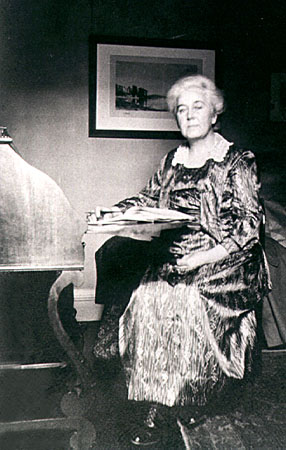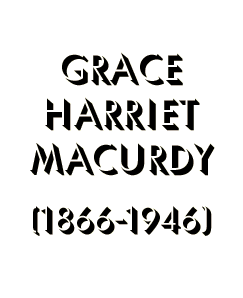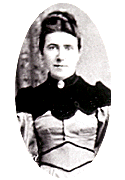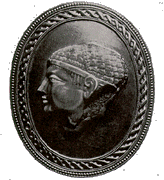 |
 |
 |
 |
 |
 |
“I think that on this side of the ocean it is the general impression that Miss Macurdy was the first American woman to meet the Greek scholars of Europe and America on something like equal terms. She has reached that position by a combination, too rarely found, of exact linguistic knowledge with learning and historical imagination.” (British classicist J. A. K. Thomson, 1937)
Pioneering Woman Scholar: Grace Harriet Macurdy, Professor of Greek at Vassar College, was the first woman classicist to focus her research on the lives of ancient women. Refusing to treat women in isolation from mainstream history, Macurdy concentrated on ancient monarchies, an area of traditional history in which a few women did play significant roles. For the Johns Hopkins University Studies in Archaeology, she published Hellenistic Queens: A Study of Woman-Power in Macedonia, Seleucid Syria, and Ptolemaic Egypt in 1932 and Vassal-Queens and Some Contemporary Women in the Roman Empire in 1937, books which have been reprinted several times and can still be found on reading lists in college and university courses. She repeatedly emphasized the similarity of these women to the men of their rank and argued that they should be treated by the historian in exactly the same manner as other monarchs: “Of these few it may be said that if they were in nature and character the counterparts of the men, they should be judged by the same standard” (Hellenistic Queens, x). Macurdy was also an outspoken advocate of modern women's right to higher education and professional careers.
 |
 |
| LIFE | SCHOLARSHIP |
Biography: I became interested in Grace Macurdy when I realized that I and others who used her books knew practically nothing about her life, certainly less than was known about other eminent women classicists of earlier periods. My research introduced me to a fascinating woman whose life vividly illustrates what it meant to forge an identity as a woman scholar at a time when there were few precedents and innumerable obstacles; I also discovered that she overcame the additional obstacle of deafness that struck during her most productive years. My aim is to write a book-length biography that will demonstrate the significance of this remarkable woman and in the process recover an important part of the intellectual and educational history of American women. More information on Macurdy may be found in this article: Barbara F. McManus, “Grace Harriet Macurdy (1866-1946): The Role of British Classics in the Self-Fashioning of an American Woman Scholar,” in British Classics outside England: The Academy and Beyond, edited by Judith P. Hallett and Christopher Stray (Baylor University Press, 2008), pp 111-128. I encourage anyone with information relevant to this project to contact me.
Acknowledgments: I am very grateful for the help given to me by members of the Macurdy family, particularly June Macurdy Landin and Caroline Skinner O'Neil, Grace Macurdy's great-nieces; the photos on this site are used with their kind permission. Nancy MacKechnie, former Curator of Rare Books and Manuscripts at Vassar College, and Dean Rogers, Special Collections Assistant, have given me invaluable assistance. I thank also Elizabeth Daniels, Vassar College Historian, and Rebecca Lawton, fomer Curator of the Vassar Art Center.
Barbara F. McManus, <bmcmanus@cnr.edu>